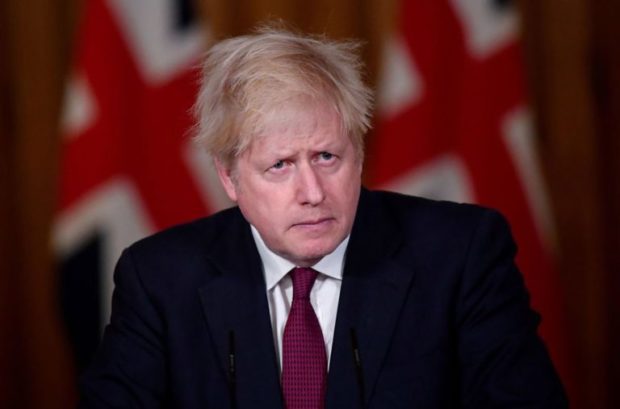Boris Johnson faces a choice in the next few hours that will define his premiership: accept a trade deal with the European Union or go it alone.
It could scarcely have come at a more difficult time for him. As he faces a binary choice about the UK’s relationship with its nearest and biggest trading partner, his government is battling a new highly contagious variant of the coronavirus that has forced European countries to impose travel bans and plunged much of England into emergency lockdown.
With only days remaining until the UK leaves the EU’s single market and customs union at 11 p.m. London time on Dec. 31, it’s still not clear which way Johnson will turn after the bloc refused to offer more concessions over the weekend.
People close to the negotiations on both sides said there’s a strong possibility a deal could be done on Monday — but acknowledge that the talks are almost as likely to collapse.
Although both sides viewed Christmas as a natural deadline, EU and British officials now don’t rule out returning later in December for one final push if that’s what’s needed. But EU officials said that it’s not really about time, but whether Johnson wants to go for it or not.
David Frost, the UK’s chief negotiator, and his team of about 25 people are in Brussels, where they await their final orders alongside their counterparts from the EU Commission.
‘Crucial Moment’
“In this crucial moment for the EU-UK negotiations, we continue to work hard with David Frost and his team,” Michel Barnier, the EU’s chief negotiator, said on Twitter on Sunday. “The EU remains committed to a fair, reciprocal and balanced agreement. We respect the sovereignty of the UK. And we expect the same.”
The entire deal — one that would encompass a security relationship and cooperation arrangements in several other areas — now hinges almost entirely on reaching an agreement on what rights EU boats will have to fish in British waters.
Johnson’s government sees taking back control of UK waters as an issue of sovereignty, while European countries with large fishing industries are resisting any moves by the EU to make concessions to secure a deal.
After discussions with member states on Friday, the Commission made an offer that would see the bloc lose around 25% of the current 650 million euros ($735 million) of fish it catches annually in British waters. The UK rejected it, and has been pushing for the EU to give up 60%, according to the officials who spoke on condition of anonymity.
Final Offer?
But the EU’s offer was widely seen as final, people close to the negotiations said.
The bloc also offered to reduce the phase-in period of the new arrangements to six years, after originally wanting 10. The UK rejected the offer of six and has proposed just three years.
A person familiar with the British side of the negotiations said that basic questions remain unanswered as to what the EU’s proposals mean for UK fishing communities.
The European Parliament, which has a veto over the whole agreement, warned it won’t be able to ratify any deal in time for the end of the transition period on Dec. 31.
The EU may have to take the rare step of applying any agreement provisionally, before putting it to a vote in the new year — or the UK could face a spell outside the bloc without a trade deal.
“We need more time,” Bernd Lange, chairman of the European Parliament’s committee on international trade, told Bloomberg Television on Monday. “We are ready to be flexible, but the final word will be in the next year.”
Failure to reach a trade deal would leave the UK doing business with its largest and nearest commercial partner on terms set by the World Trade Organization. That would mean millions of businesses and consumers would face the cost and disruption of tariffs and quotas.
Photograph: Britain’s Prime Minister Boris Johnson during a virtual press conference inside 10 Downing Street in central London on Dec. 19, 2020. Photo credit: Toby Melville/AFP/Getty Images





















 What Analysts Are Saying About the 2026 P/C Insurance Market
What Analysts Are Saying About the 2026 P/C Insurance Market  Modern Underwriting Technology: Decisive Steps to Successful Implementation
Modern Underwriting Technology: Decisive Steps to Successful Implementation  Allianz Built an AI Agent to Train Claims Professionals in Virtual Reality
Allianz Built an AI Agent to Train Claims Professionals in Virtual Reality  Earnings Wrap: With AI-First Mindset, ‘Sky Is the Limit’ at The Hartford
Earnings Wrap: With AI-First Mindset, ‘Sky Is the Limit’ at The Hartford 








